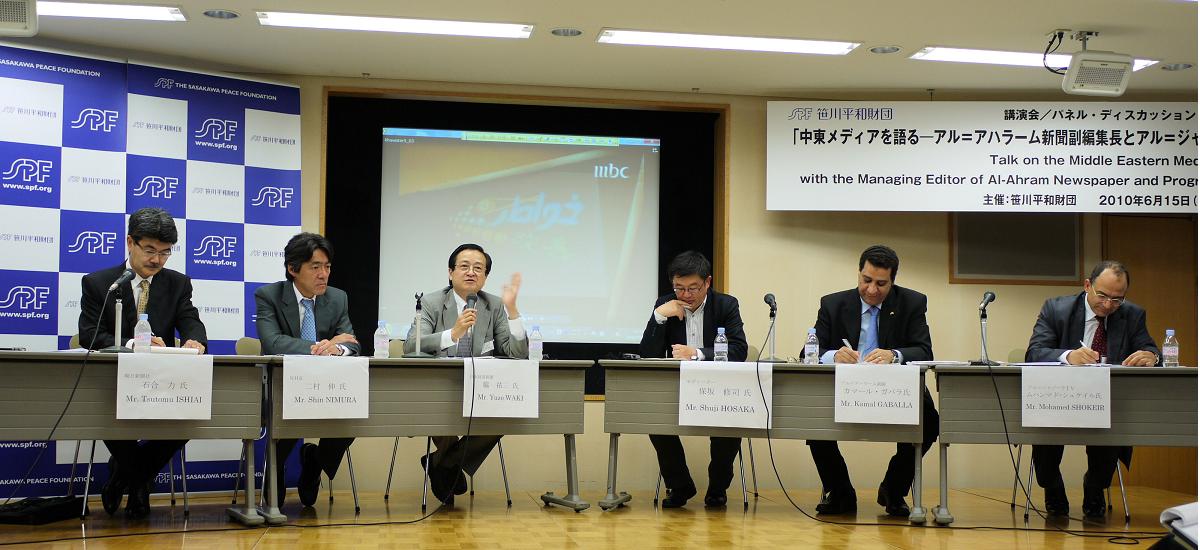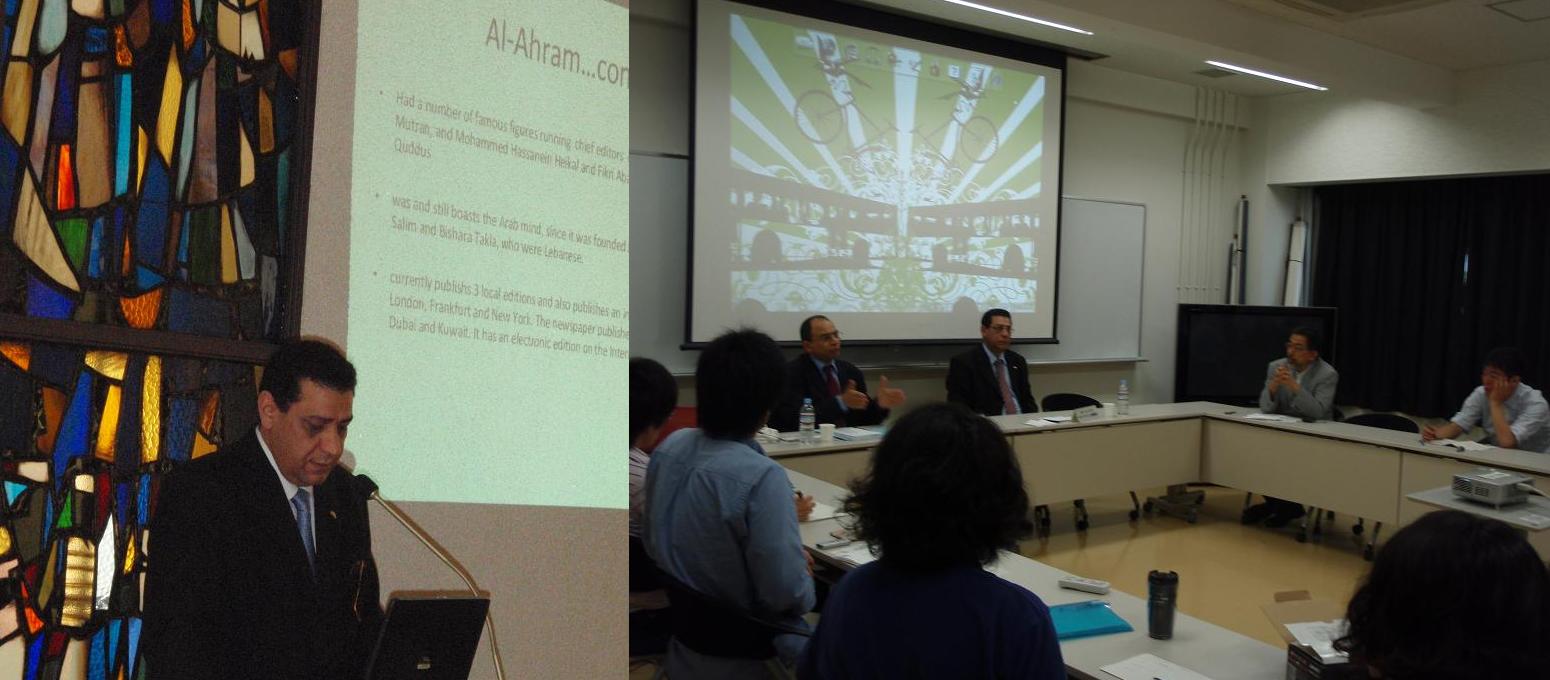Project Contents
As the supplier of 85% of Japan's energy resources, the Middle East is of immense importance to Japan. Furthermore, business is booming between the two regions courtesy of the abundance of oil money throughout the Middle East. Yet, between the two regions, there has been little advance in terms of mutual understanding. Although interest in Japan runs high in the Middle East, information about Japan in the same region is often far from accurate, being gleaned through contact with Japanese products or from news filtered through European channels. Through this project, SPF aims to enhance mutual understanding between the two regions by improving the capacity of both to distribute information and by providing opportunities for direct exchange of information. The project will be conducted in part by the foundation and in part through outsourcing to outside parties.
Implementation Plan
In the second year of this three-year project, the following activities will be carried out.
- Seminars for diplomats from Middle Eastern Islamic countries resident in Japan (four times per fiscal year):
Four seminars per year will be held for diplomats from Middle Eastern Islamic countries resident in Japan. At these events, Japanese lecturers will speak on relevant areas within the fields of Japanese politics, economy, culture, society and other areas.
- Invitation of specialists from the Middle East / Seminars on the Middle Eastern situation (twice per fiscal year):
Members of the Turkish National Diet and the specialists of Iranian Foreign Policies will be invited to Japan from the Middle East to exchange ideas regarding transmission of information and attend a seminar on the current status of Turkey, Iran, among other issues.
- Seminars to disseminate information about Japan (twice per fiscal year):
Seminars on Japanese politics, economy, education, environment and other topics will be held at universities, think tanks and research institutions in Iran and Kuwait. Expert in relevant fields will be dispatched from Japan as lecturers.
- Maintenance and management of the project Web site (www.alyaban.net) providing information on Japan in Arabic:
The Arabic language website constructed as a means to deepen understanding of Japan in the Middle East will be maintained and managed as required. In addition to written material, the website will feature images and speech presenting information on Japan in the Arabic language.
- Introduction to Japanese Culture:
Arabic language materials featuring visual information will be created as a vehicle to introduce the culture of contemporary Japan to the Middle East Islamic region.
Project Content
1. Seminars for diplomats from Middle Eastern Islamic countries resident in Japan
2. Invitation of specialists from the Middle East / Seminars on the Middle Eastern situation

Panel Discussion ( June 15, The Nippon Foundation Bldg. 2F)
Since the Gulf War in 1990, Japan has rapidly become interested in the Middle East, and news concerning the region has become more widely reported in the Japanese press. However, Japanese people have few opportunities to come into direct contact with news as covered by the Arab media due to the language barrier.
As an initial step to improve such a situation, the Sasakawa Middle East Islam Fund invited to Japan Mr. Kamal Gaballa, Managing Editor, Al-Ahram Newspaper (Egypt) and Mr. Mohamed Shokeir, Programme Editor, Al-Jazeera English (satellite broadcast; Qatar). They took part in a discussion entitled 'Talk on the Middle Eastern Media with the Managing Editor of Al-Ahram Newspaper and Programme Editor of Al-Jazeera TV' at The Nippon Foundation Building, Tokyo on June 15. On the day, the invited guests spoke on the current status and influence of the Arab media, and took part in a panel discussion with three Japanese journalists well versed in the situation in the Middle East.
On the 17th of June, the Fund co-hosted a lecture with Doshisha University in Kyoto, which was attended by around two hundred students and members of the public. In addition to speaking at these two events, Mr. Gaballa and Mr. Shokeir called on the Graduate School of Asian and African Area Studies (ASAFAS) at Kyoto University and gave a presentation at a research meeting hosted by Yasushi Kosugi, Professor, ASAFAS on the current status and political role of the Middle Eastern media.

Lecture (June 17, Doshisha University) / Research meeting (June 18, Kyoto University)
3. Seminars to disseminate information about Japan
4. Maintenance and management of the project Web site (alyaban.net) providing information on Japan in Arabic
5. Introduction to Japanese Culture
Project Results
This project is designed to deepen understanding between the Middle East and Japan through seminars for diplomats from Middle Eastern Islamic countries in Japan, seminars by Middle East specialists on the state of affairs in the Middle East, and an Arabic language website, Alyaban net, featuring information on Japan. In fiscal 2010, two seminars were held for diplomats from Middle Eastern Islamic countries resident in Japan, at which members of both Japan's ruling and opposition parties in the Diet lectured on their respective Middle East and economic policies. Symposia covering circumstances in Egypt and Turkey also helped further the understanding of Japanese specialists and journalists with an interest in the Middle East. In addition, a seminar providing information on Japan was held in Tehran, co-hosted by the Institute for Political and International Studies (IPIS) under the title, "Working for Mutual Understanding Between Iran and Japan."
Seminars for Diplomats from Middle Eastern Islamic Countries Resident in Japan (Closed session)
- May 10, 2010
- Mr. Yoshinori Suematsu, Member of the House of Representatives
Mr. Yasutoshi Nishimura, Member of the House of Representatives
- October 20, 2010
- Mr. Jin Matsubara, Member of the House of Representatives
Mr. Taro Kono, Member of the House of Representatives
Seminars with Specialists on the Middle Eastern Situation
- May 31, 2010
- Luncheon and lecture on Iranian diplomacy and Iran-Japan relations
(Closed session)
H.E. Mr. Manouchehr Mottaki, Foreign Minister of the Islamic Republic of Iran
- June 15, 2010
- The Present Situation of Influential Media in the Middle East and
their impact
Mr. Mohamed Shokeir, Programme Editor of Al-Jazeera English TV
Mr. Kamal Gaballa, Managing Editor of Egyptian newspaper Al-Ahram,
- December 2, 2010
- The Political Situation in Egypt
Ambassador Dr. Mohamed Ibrahim Shaker, Chairman of the Egyptian Council
for Foreign Affairs and former Ambassador of the Arab Republic of Egypt to
the United Kingdom
Ambassador Mr. Wahib El Miniawy, Member of the Council's Board of
Directors and former Ambassador to Japan
- January 20, 2011
- Current Situation of Iraq
H.E. Mr. Lukman Faily, Iraqi Ambassador to Japan
Commentator Mr. Motohiro Oono, Member of the House of Councilors
(The Democratic Party of Japan) and Visiting Fellow of the Middle East
Research Institute of Japan
- January 26, 2011
- New Dynamics of Turkish Foreign Policy
Dr. Ibrahim Kalin, Chief Advisor to the Prime Minister of Turkey
Panelists Mr. Phar Kim Beng, Director of Research and Strategy, Foreign Policy
Study Group
Dr. Yasushi Hazama, Director, Middle Eastern Studies Group, Area Studies
Center, Institute of Developing Economies
- February 21, 2011
- Drastic Change in Middle East: Validating Civil Uprising in Tunisia
and Egypt
H.E. Dr. Noureddine Hached, former Tunisian Ambassador to Japan
Yoshiaki Sasaki, Advisor to SMEIF/SPF
Seminars for the Dissemination of Information from Japan
- September 19-20, 2010
- Working for Mutual Understanding between Iran and Japan
Experts from Japan and Iran engaged in a multidisciplinary exchange of
opinions on the future shape of Japan-Iran relations, from both political and
economic perspective.
Tehran, Iran
Co-hosted with the Institute for Political and International Studies
(IPIS) (Iran)
Mr. Hideyuki Sekioka, visiting Professor, Takushoku University
Mr. Hidetoshi Tashiro, Professor Business Breakthrough University
Jiro Hanyu, Chairman of SPF, Yoshiaki Sasaki, advisor to SMEIF/SPF, and
Akira Matsunaga, Program Officer of SMEIF/SPF


